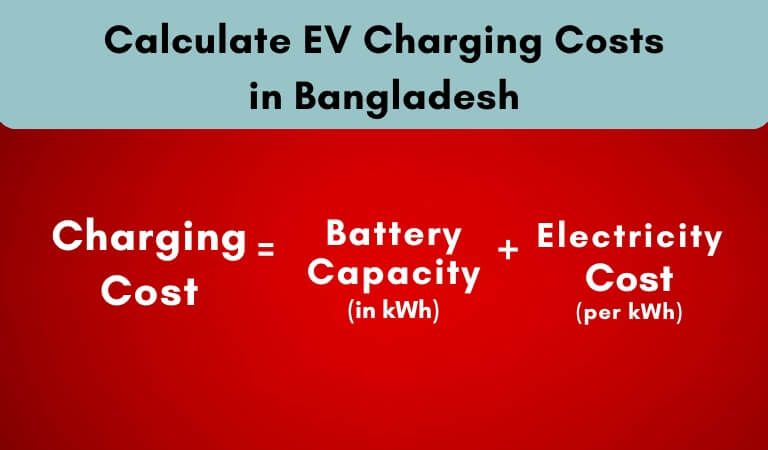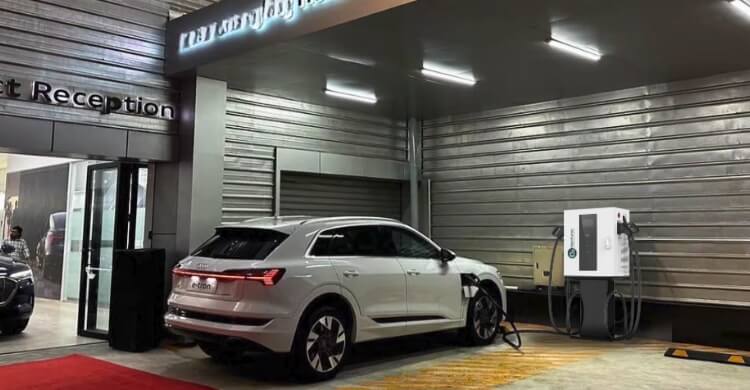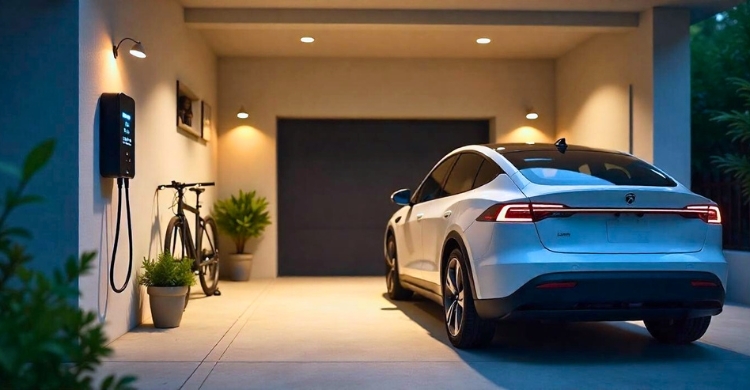Electric vehicle (EV) charging costs in Bangladesh are something more people are starting to think about. As fuel prices go up, many are adopting electrical transportation systems to save money and help the environment.
But to use an EV system, you need to understand how much it costs to charge. This cost can change depending on how and where you charge your car. So, how to calculate EV charging costs in Bangladesh?
Start by identifying your EV’s battery capacity in kilowatt-hours (kWh). Multiply that by the electricity rate—typically around 6.50 BDT/kWh for home charging. Then, factor in a charging efficiency multiplier (usually 1.10 to 1.15) to account for energy loss.
Keep reading to learn each step clearly and see how you can manage your EV charging costs easily!
How to Calculate EV Charging Costs in Bangladesh?
Electric vehicles, or EVs, are getting more popular in Bangladesh, and many people are curious about how much it costs to charge them. Calculating these costs involves several steps because it depends on things like electricity prices and the type of charger you use. Let’s break it down in a simple step-by-step guide.

Step 1: Find Out Your EV’s Battery Size
Start by checking how big your EV’s battery is, which is measured in kilowatt-hours (kWh). For example, a Nissan Leaf has a 40 kWh battery, and a BYD e6 has a 60 kWh battery. The size of the battery will help you figure out how much it will cost to charge.
Step 2: Look Up Electricity Rates in Bangladesh
Next, find out how much electricity costs, which can be different depending on whether you charge at home, at a business, or at a public charging station. At home, it might cost between 5.50 and 8.00 BDT per kWh, at businesses from 10.00 to 12.00 BDT per kWh, and at public chargers between 15.00 and 20.00 BDT per kWh.
Step 3: Calculate the Charging Cost
To find out how much it will cost to charge your EV, use this simple formula: Total Cost = Battery Size (kWh) × Electricity Rate (BDT/kWh) × Charging Efficiency Loss. For example, if you’re charging a 40 kWh battery at home at a rate of 6.50 BDT per kWh and a 10% loss in efficiency, it would cost about 286 BDT.
Step 4: Compare Fast Charging with Slow Charging
Charging at home slowly is cheaper but takes a long time, usually 6-8 hours. Fast charging at a public station costs more but is much faster, taking only about 30-60 minutes.
Step 5: Analyze Additional Factors
Additional aspects like time-of-use tariffs can affect your monthly EV charging cost, as some providers offer lower rates during off-peak hours. Also, using solar charging can significantly reduce costs, and it’s worth checking if there are any government subsidies for EV charging.
Step 6: Check for Government Help
Look into any government discounts or incentives that may reduce your charging costs. The government may offer subsidies, rebates, or tax benefits to encourage EV adoption and make charging more affordable. These initiatives can significantly lower your overall cost of owning and operating an electric vehicle.
Step 7: Estimate Your Final Costs
Once you’ve accounted for all factors, including electricity rates, charging type, efficiency losses, and government incentives, you can estimate your final monthly charging costs. Multiply your average number of charges per month by the cost per charge, factoring in any applicable subsidies or off-peak rates. This will give you a clearer picture of your EV’s charging expenses.
Key Factors Affecting EV Charging Costs in Bangladesh
Electric vehicles are becoming more common in Bangladesh, and many people want to know how much it costs to charge them. But the cost isn’t always the same for everyone, and that can feel a bit confusing at first. There are a few things that change the price depending on how, when, and where you charge. Once you understand these factors, it’s much easier to figure out what affects the total charging cost.

Battery Size
The bigger your EV’s battery, the more electricity it needs to charge fully. That means a car with a 60 kWh battery will cost more to charge than one with a 30 kWh battery. So, battery size plays a big role in the final cost. It’s kind of like filling a big water tank compared to a small one—it takes more water, so it costs more. Always check your car’s battery size to get a better idea of your charging cost.
Electricity Rates
Electricity in Bangladesh doesn’t have one fixed price for everyone. If you’re charging at home, you’ll usually pay less—between 5.50 and 8.00 BDT per unit. But if you’re using a public charging station, it can cost between 15.00 and 20.00 BDT per unit. The place where you charge makes a big difference. That’s why it’s cheaper to charge at home when you can.
Charging Efficiency
When you charge an EV, not all the electricity goes into the battery—some of it is lost. This is called charging loss, and it usually adds about 10% to 15% more to the cost. So, even if your battery is 40 kWh, you might need to pay for around 44 kWh worth of electricity. This extra bit is something many people forget to count. But it’s important if you want to know the full cost.
Fast vs. Slow Charging
Fast chargers work quickly but cost more, while slow chargers take time but are cheaper. Fast charging is useful when you’re in a hurry or on a long trip. However, if you charge at home overnight using a slow charger, you’ll save money. It’s a choice between saving time and saving money. Both have their benefits depending on your needs.
Time and Source
The time you choose to charge can also affect the cost. Some places have cheaper electricity rates at night, which can lower your total cost. Also, if you use solar panels to charge your EV, the cost can go down a lot. That’s because sunlight is free, so you’re not paying for regular electricity. Charging during off-peak hours or using solar power is a smart way to save.
Many small things come together to decide how much you’ll spend on EV charging. Along with that, choosing the right EV charging service provider in Bangladesh can also make a big difference in cost and convenience. Whether you charge at home or outside, keeping these points in mind will help you save money.
Electricity Rates in Bangladesh: What You Need to Know
Electricity rates in Bangladesh can be a bit puzzling because they change based on where and how you use your power. These rates are essential for everything from household budgets to how much it costs to charge an electric vehicle. Let’s simplify what you need to know about the different rates. Understanding these can help you manage your electricity use more effectively.
- Residential Rates: Most homes pay between 5.50 and 8.00 BDT per kWh. This rate depends on how much electricity you use each month.
- Commercial Rates: Businesses usually pay higher, around 10.00 to 12.00 BDT per kWh. The cost reflects the greater energy usage typical of commercial spaces.
- Public Charging Rates: Using public EV chargers costs more, typically 15.00 to 20.00 BDT per kWh. These stations charge extra because they offer fast charging speeds.
- Rural Rates: In rural areas, rates might be slightly lower to promote accessibility. However, the quality and reliability of supply can vary.
- Industrial Rates: Factories and large-scale operations face rates from 6.00 to 9.00 BDT per kWh. Industries often get a slightly reduced rate due to their massive consumption levels.
Does Charging at Home Save You Money?
Yes, charging at home does save you money—most of the time. It’s often cheaper than using public charging stations, especially if you charge at night when rates are lower. Also, you don’t have to pay extra service fees like you do at public chargers. Here are some reasons why you should charge at home.

Lower Electricity Rates
Home electricity prices are usually between 5.50 and 8.00 BDT per unit. Public charging stations cost 15.00 to 20.00 BDT per unit. That’s almost twice as much as home charging. So, charging at home already saves you a good amount.
No Extra Service Fees
Public chargers often add extra service or maintenance fees. At home, you only pay for the electricity used to charge your car. There are no hidden or extra costs added. That makes home charging much cheaper overall.
Flexible Charging Times
When you charge at home, you can pick the time that works best for you. Some places offer cheaper electricity at night. Charging during those hours can help you save more money. Public chargers don’t always give you that choice.
Long-Term Cost Savings
If you charge at home every day, the savings add up over time. Public charging might seem okay once or twice, but daily use becomes expensive. Even a small saving per day turns into a big amount each month. So, charging at home is better in the long run.
Convenience and Comfort
You don’t need to travel to a charging station or wait in line. Just plug your EV in while you rest or sleep. It’s easy, quick, and always available at home. That saves both your time and your energy.
Less Battery Damage
Fast charging at public stations can heat up your battery and damage it slowly. Home charging is slower but safer for the battery. A healthy battery lasts longer and needs fewer repairs. This also helps you save money later on.
Tips to Reduce Your EV Charging Expenses
Electric vehicles are a smart way to save fuel money, but charging them still comes with a cost. If you charge often, even small changes in how and when you charge can help you save. Many people don’t realize how simple habits can reduce their EV charging bills. Here are some easy and practical tips you can follow to cut down your charging expenses.
- Charge During Off-Peak Hours: Electricity is cheaper during night or off-peak times in many places. Charging at night can lower your monthly charging cost easily.
- Use Home Charging More: Charging at home is usually much cheaper than public stations. It avoids extra service fees and keeps your daily costs low.
- Avoid Frequent Fast Charging: Fast charging is quick, but it costs more and can harm your battery. Try using slow charging for daily use to save money.
- Track Your Charging Usage: Use apps or smart meters to see how much electricity your EV uses. This helps you control usage and avoid overcharging.
- Plan Long Trips Smartly: Before long drives, plan where to stop for charging. Saving money includes finding hotels with EV charging to avoid high public station fees.
Frequently Asked Questions About EV Charging Cost in Bangladesh
Electric vehicles are becoming more popular in Bangladesh, and many people are trying to understand the real cost of charging them. Knowing how to calculate EV charging costs helps drivers make smarter choices. Here are some frequently asked questions to guide you better:
What is the Formula to Calculate EV Charging Cost?
To calculate the cost, multiply your EV’s battery size (in kWh) by the electricity rate (BDT/kWh), and then multiply that by a charging efficiency factor (usually 1.10 to 1.15). This gives you the total amount spent per full charge.
How Do I Find My EV’s Battery Capacity?
You can find your EV’s battery size in the car manual, on the dashboard display, or on the manufacturer’s website. It’s measured in kilowatt-hours (kWh). This number is very important because it helps you know how much energy you’re using.
Is the Charging Cost Always the Same Every Month?
No, charging costs can change every month based on how far you drive, your electricity rates, and charging times. If you drive more or charge during peak hours, your cost will increase. Tracking your charging helps you understand the changes better.
Do All EVs Have the Same Charging Cost?
Not all EVs have the same charging cost. Larger batteries need more electricity, which means higher costs. Some EVs also charge more efficiently than others. So, the type of car you have plays a big role in your total cost.
How Does Weather Affect Charging Cost?
Cold weather can reduce your battery’s efficiency, making it use more electricity to drive the same distance. This means you’ll need to charge more often, increasing your overall cost. Hot weather may also affect battery performance, but usually not as much.
Can the Charging Cost Be Reduced With Solar Panels?
Yes, solar panels can reduce your EV charging cost a lot. Once installed, they provide free electricity from sunlight. This means you won’t have to depend fully on the national grid, saving money over time and making your EV even greener.
Does Driving Speed Change My Charging Frequency?
Yes, the faster you drive, the quicker your battery drains. High speeds use more power, which means you’ll need to charge more often. More frequent charging adds to your total monthly cost. Driving at a steady speed helps save electricity.
What’s the Role of Charging Cables in Cost?
Using good-quality charging cables makes charging safer and more efficient. Poor cables can waste energy through heat or resistance, which increases your total electricity usage. That means more money spent. Always check that your charging cable is in good condition.
Can I Track My Charging Cost Easily?
Yes, many EVs and charging apps let you track how much electricity you’ve used and how much it costs. Some apps even show daily and monthly totals. Keeping track helps you see patterns and manage your charging habits more smartly.
Is It Cheaper to Charge During Certain Hours?
Yes, charging during off-peak hours, like late at night, can lower your electricity cost. Some areas offer cheaper rates during those hours. If you plan your charging schedule smartly, you’ll save money without doing anything extra. It’s an easy win.
Final Thoughts
Your electric car can be charged at a lower cost in Bangladesh if you have a proper understanding of the cost. Things like your battery size, where you charge, and the time you charge all change the cost.
Learning how to calculate EV charging costs in Bangladesh makes it easier to plan and spend less. Charging at home, using less fast charging, and using solar power if possible can help lower the cost. By following these simple tips, you can enjoy your EV and keep your charging costs low.
